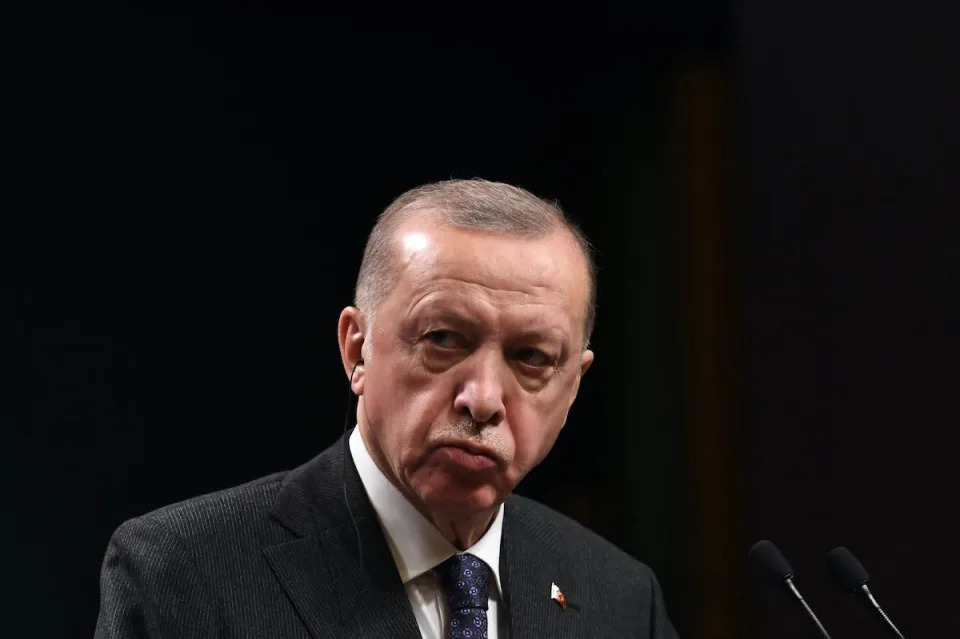Turkey plays a special role in the Ukraine war: On the one hand, the country is a member of NATO, which is clearly on the side of Ukraine. On the other hand, Turkish President Recep Tayip Erdogan has established close ties between his country and Russia and its President Vladimir Putin.
Turkey’s reaction to the Russian war of aggression against Ukraine was therefore muted. For example, the country did not join the US and EU sanctions against Russia, but supplied arms to Ukraine and blocked the Bosphorus and Dardanelles from the passage of Russian warships. With this approach, Erdogan’s government is trying to do justice to both its NATO allies and what is happening in Ukraine, as well as its ally in the Kremlin.
A difficult undertaking, the experts from the Ankara office of the Konrad Adenauer Foundation (KAS) also analyze in a paper available to Business Insider. “Turkey is dependent on Russia in terms of security policy, energy policy and the economy and is therefore trying to adopt a balanced approach,” it says. The country is trying to gradually reduce its one-sided dependencies on Moscow. “Due to the complicated domestic political situation and the serious economic crisis in Turkey, a massive change of course, including a connection to the US and EU sanctions of the current government under President Recep Tayyip Erdogan, is not to be expected without concrete protection and support from the West.”
About Turkey’s special role in the Ukraine conflict:
According to the KAS paper, Turkey has long taken a hard line against war veterans Russia, especially in the Syrian war. Since 2015, however, there has been a “dramatic rapprochement” and “unprecedented cooperation” between the countries. However, this newly developed cooperation would now be put to the test by the Ukraine war, especially since Turkey has clearly acknowledged the territorial sovereignty of Ukraine since Russia annexed Crimea.
Nevertheless, “the mutual dependencies, especially in the energy sector, and the good personal
relations between Vladimir Putin and Recep Tayyip Erdoğan have made it possible to maintain constructive relations despite many difficulties,” write the KAS experts. Turkey’s approaches to Russia in recent years are of a tactical nature and should be understood more as a “self-confident appearance of a regional power” than as “Turkey’s reorientation towards Russia”. In the medium term, Moscow will remain Ankara’s biggest strategic competitor. The longer the Ukraine war goes on, the more difficult it will be for Turkey to maintain strategic balance with Russia.
About Turkey’s dependencies on Russia:
This task is made even more difficult by Turkey’s many dependencies on Russia. For example, the Kremlin and the Erdogan government are opposing war opponents in Syria, among other places – while Turkey is making arms deals with Russia, for example for the S-400 air defense system.
The KAS experts write that there are also many economic dependencies between Turkey and Russia. 19 percent of all annual tourists in Turkey come from Russia, which is also the largest supplier of grain to Turkey. Russia is also Turkey’s second largest energy supplier – a situation from which Turkey is trying to free itself, for example, by buying liquid gas from the USA. With success: According to the KAS analysis, gas imports from Russia fell by almost 50 percent between 2017 and 2019.
On the domestic political pressure on the Erdogan government:
Presidential elections will be held in Turkey in 2023 – and this at a time when the Turkish lira is in deep crisis and the prices for food and other goods in the USA are exploding. Erdogan is therefore seeking salvation in foreign policy, the KAS paper says: “Ultimately, the Turkish government currently has only one goal: to win the elections in 2023 and to ensure that it stays in power. The disastrous economic situation is the biggest obstacle here. President Recep Tayyip Erdoğan has little room for maneuver domestically and is therefore trying to score points with foreign policy.”
About the effects of the Ukraine conflict on German-Turkish relations:
With his support for Ukraine, Erdogan is not only successful internally but also externally, the analysts continue. Turkey’s strategically important role in NATO has once again become clear in the conflict. Turkey is also important for its allies as a dialogue partner with
Russia. Erdogan’s diplomatic involvement in the Ukraine war is his “best chance to improve the very tense relations between Turkey, the USA and Europe.”
About Turkey as a new energy hub for Europe:
For Germany, a rapprochement with Turkey could be of particular interest in energy policy. In Germany’s attempt to become independent of Russian gas, “the expansion of the southern gas corridor and the use of Turkey as a strategic energy hub with access to gas deposits in the Caspian Sea and eastern Mediterranean could offer real alternatives in the longer term.” The potential for importing Azerbaijani, Turkmen, Iraqi and, in the future, Iranian oil and gas has not yet been exhausted. The conclusion of the authors: “With the Israeli-Turkish energy cooperation now becoming increasingly realistic, Turkey can position itself as an energy hub.”

